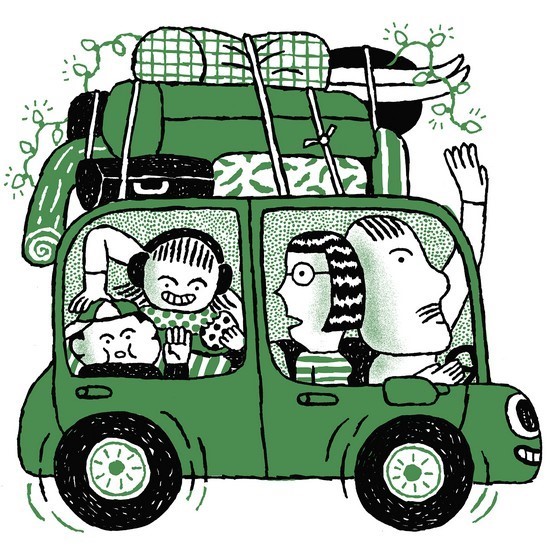It is no secret that the holidays are stressful. And
the reasons for that are plentiful: social obligations, gift-giving woes,
family tensions, travel challenges, financial concerns, and the list goes on.
اضافة اعلان
So, we asked experts to provide a few solutions to our
holiday stressors. Consider their answers our gift to you.
Busy schedulesSchedules are overwhelming. This time of year can be so busy
that being overbooked seems inevitable. But if adding another obligation to
your plate makes you want to scream, setting boundaries might be in order,
according to Nedra Glover Tawwab, a licensed therapist and author of “Drama
Free: A Guide to Managing Unhealthy Family Relationships.”

First, determine what is important: Look at the commitments
on your calendar and decide how much time and energy you are willing to devote
to each, said Afton Kapuscinski, a clinical psychologist and associate teaching
professor of psychology at Syracuse University. Think about previous years’
patterns to help you decide what feels right. If that is difficult, ask a loved
one whether your schedule looks manageable. An outside perspective from someone
who cares about your best interests can be valuable, she said.
Once your priorities are sorted, you will need to get
comfortable saying no. Inger E. Burnett-Zeigler, a licensed clinical
psychologist and associate professor of psychiatry and behavioral sciences at
the Northwestern University Feinberg School of Medicine, recommended three ways
of declining. You can simply say, “No,” because “‘No’ is a complete sentence,”
she explained. You can say, “No, not right now,” and suggest a different
timeline, or you can say, “I can’t do this, but I can do that”.

Still, there are times when we cannoy prioritize our
comfort: “Sometimes we just have to show up,” Glover Tawwab said.
Remembering why these obligations are important can help
give you a little motivation.
Family tensionFamily feuds seem unavoidable. For some of us, family tension
is its own kind of holiday tradition. Karl Pillemer, a family sociologist and
professor of human development at Cornell University and the author of “Fault
Lines: Fractured Families and How to Mend Them,” suggested a few rules of
engagement.
Remind yourself that family gatherings are not the time to
“fix” anyone, Pillemer said. It is tempting to wade into heavy or personal
topics, but avoid using a holiday meal to persuade your parents to take better
care of their health.
As for tense political discussions, ask yourself: Is there
any chance of changing hearts and minds? If the answer is no, do not engage,
Pillemer said.

If you are lured into a heated debate or stressful family
situation, try to “embrace the strategy of underactivity,” he said. Instead
of responding immediately, observe what your loved ones are doing and how you
are feeling. You might imagine that you are a researcher watching your family’s
interactions unfold, rather than someone enmeshed in the drama.
Giving yourself physical distance is also important,
Pillemer said. Book a hotel room, stay with a neutral friend, or keep your
holiday visit short. And, most important, take some space when you feel tension
building.
“The goal,” Pillemer said, “is to focus on underreacting —
and stepping away when you need a break.”
MoneyMoney is tight. Economic worries have made this holiday
season particularly stressful for some. Still, a meaningful, memorable December
is possible.
Rick Kahler, a financial therapist and planner based in
Rapid City, South Dakota, suggested taking time to think about what you can
realistically afford.

Once you have a budget, discuss what you cherish most about
the season with your loved ones and prioritize spending on those things, said
Judith Gruber, a social worker and financial therapist based in East Lyme,
Connecticut.
Here are a few tweaks you can make to celebrate the season a
little more frugally:
Opt for exchanges or experiences.Gift exchanges, like white elephant
and secret Santa, are a tried-and-true way to cut gifting costs, but giving
people experiences instead of objects is also an option.
“Experiences tend to be more emotionally evocative,” and
strong feelings bolster relationships, said Cindy Chan, an assistant professor
of marketing at the University of Toronto Scarborough.

Low-cost ideas include organizing a winter hike, scheduling
a museum trip on a local free day, going for hot chocolate and ice skating, or
hosting a cookie-baking party or game night.
Encourage potlucks.The lavish holiday meal can be a
particular financial burden for the host, Kahler said, because there’s often so
much tradition wrapped up in it. Hosts may think, “We’ve got to have a big
meal. We’ve got to have the whole family there. The meal’s got to look like
this or consist of this,” he said.
To curb costs without canceling, he suggested switching to a
potluck. Or, if you live close to the other guests, you can throw a progressive
dinner party, in which attendees travel to a different person’s home for each
course.
Go virtual, or celebrate in January.Travel costs can make
in-person celebrations unrealistic. And even though you might be sick of
virtual parties, dusting off your ring light and hosting an event over video
can help you stay connected. To keep it interesting, send everyone the same
recipe ahead of time and cook and eat the meal together (or make cocktails, for
a less labor-intensive activity).

You can also book a January or February “holiday” trip,
taking advantage of off-peak airfare. Looking forward to a vacation during the
depths of winter can make quieter holidays a little easier.
Vacation anxietyVacation arrives, but relaxation does not. Even if you are
fortunate enough to have time off, your mind might still churn with work
deadlines, financial woes, and an expanding to-do list. If you find yourself
unable to relax even after your out-of-office reply is set and your schedule is
clear, “you need to give yourself grace,” said Angela Neal-Barnett, a
psychology professor at Kent State University. It can be challenging to detach
just because you’re out of the office, but these four tips can help.
Forgo multitasking.Vacation is likely to be the one chunk of
time you can devote to being present, Neal-Barnett said. Focusing on the task
in front of you (watching a holiday movie or wrapping presents) instead of
simultaneously catching up on emails can help soothe stress. When we are
distracted, our minds ping from one thought to another, making us feel
overwhelmed. It’s important to remember that when we take time off, we have
been granted a period to do nothing, she added.
Try progressive muscle relaxation.Neal-Barnett recommended a
quick exercise to ease anxiety when stress hits: Tense your muscles for 30
seconds, then exhale and release the tension. Start with one muscle group, like
your thighs or your arms, moving around your body until your breathing slows
and you feel calmer.

Schedule worry time.If a concern pops up, set aside time to
think about it when vacation is over. Put a note on your phone or send yourself
an email, signaling to your brain that you’ll address it later, said Thea
Gallagher, a clinical psychologist at NYU Langone Health. “Ask yourself: Am I
really going to do anything about this right now?” she said. If not, “it’s just
thought garbage”.
TravelingTraveling is a nightmare. Wrangling yourself, loved ones and
your belongings into a plane, train or automobile can cause chaos. So, it is
best to do what you can to prepare in advance, said Paula Twidale, senior vice
president of travel at AAA.
If you are flying, book assigned seats early, especially if
you are with children, to ensure that everyone can sit together. If you are
concerned about delays, aim for the earliest departure, which is the most
likely to depart on time, Twidale said.
Scheduling a transport service from the airport to where
you’re staying, or booking a space at a parking garage, can reduce delays
outside the airport. And if you can avoid checking a bag, you should, Twidale
said.
Drivers should pack their cars like they are going camping:
Bring water, snacks, and a blanket, in case roadside issues crop up, Twidale
said. And check the car battery, engine, and tire pressure beforehand to avoid
any malfunctions on the road.
Of course, no matter how much you prepare, travel comes with
some uncertainty. But accepting the stress that arises may actually help you
manage it, said Michael Ziffra, a psychiatrist at Northwestern Medicine.

Try writing down your top five worries ahead of time, a
technique often used in cognitive behavioral therapy, he said. Beside each
worry, explore how likely it is that your concern will happen and how bad it
would be if it did.
This practice can help replace worst-case scenarios in your
mind with situations that are more realistic, Ziffra said.
Phone dependenceEveryone is on a phone. Many of us are eager to limit screen
time, hoping to relish quality moments instead. Still, we may find ourselves
scrolling in the interval between dinner and dessert, or tunneling into social
media during family game night. For those looking to cut down, “the single
biggest thing you can do” is to put physical distance between yourself and your
device, said Adam Alter, a marketing professor at NYU Stern School of Business
and the author of “Irresistible: The Rise of Addictive Technology and the
Business of Keeping Us Hooked.”
For anyone unwilling to leave the phones in another room,
these tips can help.
Reevaluate your notifications.If you want to keep your phone
nearby for emergencies or use it for photos, pause notifications that aren’t
essential, said Larry Rosen, a psychologist and author of “The Distracted Mind:
Ancient Brains in a High-Tech World”.
You can also move your most used apps into a separate folder
on your phone, far away from your main screen, or try putting your phone on
airplane mode, which suspends Wi-Fi and cellular service, Alter said.
Time your tech breaks.If forgoing your phone is too intense,
or infeasible, start with a timed break, Rosen said. Put your phone aside and
set a timer for 15 minutes so that you can check your notifications and respond
to anything urgent when your break is over.
During a family gathering, give everyone a chance to check
phones beforehand, then set them all to the side for 15 minutes, or take
scheduled breaks from devices while spending time together.

Fill the gap. Parents may be particularly eager to tug their
children away from their devices. If you’re looking to wrench holiday guests of
any age off their phones, offer an alternative, Alter said — an activity that
can take the place of mindlessly looking at a screen. Maybe that’s a card game
or a conversation topic everyone can chime in on, like a shared TV show or
family tradition.
“You can’t just say, ‘Don’t use your phone,’’’ he said. “You
need to fill the vacuum.”
FOMOOther people are having way more holiday fun. There is a lot
of pressure to be social during the holidays. Those expectations can make you
feel pretty low, particularly if your social feeds are full of parties you were
not invited to or people who seem to have harnessed the holiday spirit in a way
you just cannot.
Limiting social media use is one obvious fix, but gratitude
can also be a potent antidote to holiday FOMO, the fear of missing out, said
Jaime Kurtz, a professor of psychology at James Madison University who has done
extensive research on “savoring,” the ability to notice positive experiences
deliberately.
“FOMO is really all about scarcity, all the things you don’t
have,” she said. “Gratitude and savoring are the opposite.”
Kurtz recommended starting a simple gratitude practice early
in the holiday season. Spend some time considering the things you are
anticipating.
As the holidays unfold, make an effort to savor the season,
Kurtz said. Take slow, intentional bites of your favorite foods to notice the
taste and texture. Pause and appreciate the coziness of your home. You can take
just five seconds and quietly acknowledge the experience, Kurtz said. Those
moments, strung together, can help you focus on what you have rather than
someone else’s holiday fun.
Read more Lifestyle
Jordan News



